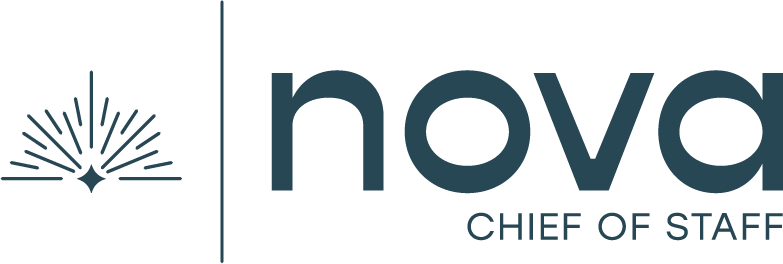Will AI Replace Executive Assistants?
Thoughts from Nova Chief of Staff
A few weeks ago on LinkedIn, I shared an article featuring Bill Gates’ thoughts about AI and executive support. To summarize, Gates said that in five years AI agents will be able to help you in the same way that personal assistants support today’s executive leadership.
From Gates:
"In the next five years, [how you use a computer] will change completely. You won’t have to use different apps for different tasks. You’ll simply tell your device, in everyday language, what you want to do. And depending on how much information you choose to share with it, the software will be able to respond personally because it will have a rich understanding of your life.
"...Whether you work in an office or not, your AI agent will be able to help you in the same way that personal assistants support executives today. If your friend just had surgery, your agent will offer to send flowers and be able to order them for you. If you tell it you’d like to catch up with your old college roommate, it will work with their agent to find a time to get together, and just before you arrive, it will remind you that their oldest child just started college at the local university."
So what does that mean for Executive Assistants (EAs)? Here’s my take as the founder of Nova Chief of Staff.
Regardless of gains in Artificial Intelligence, five years from now I believe that Executive Assistants will continue to drive most of the same activities they do today, but likely with support from new tools and resources, including AI.
Executive leaders will likely continue to spend their time the same way, outsourcing the planning and execution of administrative responsibilities. For example, I don't see executives using AI bots to order catering for an offsite. But I do see their EAs leveraging new tools to get their work done–like catering for an event–with more efficiency and better quality.
Acknowledging how quickly AI has spread throughout the market, I believe that we’ll be operating very differently in less than five years than we are today. When I shared the article about Gates’ prediction a few weeks ago, I received a lot of excellent thoughts on the topic from my network. Here are some to consider.
Employers already expect to see experience with leveraging AI listed as a skill on EA's CVs. AI is already an important skill, and that’s a trend set to continue. Executive Assistants should highlight proficiency in using AI-driven tools for calendar management, scheduling, and task prioritization on their resume. This may include experience with virtual assistants or AI-powered software that streamlines administrative processes.
The integration of AI can take over simpler tasks, empowering EAs to delve deeper into strategic responsibilities. AI tools can handle routine email responses, data entry, or travel arrangements, allowing EAs to shift their focus to higher priority tasks, such as working closer with their leader to initiate strategic initiatives. The utility of AI works in parallel to the growing trend of EAs seeking greater strategic responsibility and more advanced training.
EAs will have their own AI Bot. An AI bot will assist an Executive Assistant by providing real-time updates on meeting changes, suggesting optimal scheduling times, or even automating follow-up emails based on the executive's preferences–thereby enhancing efficiency and allowing more capacity for more strategic level tasks.
Despite advancements, the emotional intelligence and empathy required for many EA decisions remain unmatched by artificial intelligence. Let’s be real: Executive Assistants handle delicate matters and sensitive information. AI may struggle to navigate these situations with the required emotional intelligence, understanding, and empathy that humans bring to the table.
The confidential nature of EA work continues to impose limitations on the widespread use of AI in the C-suite. Executive Assistants often deal with confidential information such as strategic plans, financial data, or information regarding personal matters. AI usage may be restricted in these areas to ensure data security and privacy.
EAs know the ins and outs of their executive's life. It's impossible to load an AI tool with the precision and knowledge that EAs learn and intuit over time. Overtime, an Executive Assistant learns the preferences, habits, and unique needs of their executive. This deep understanding allows them to make nuanced decisions that AI–lacking personal experience and the nuance of years of knowledge–will struggle to replicate.
In summary, I don't believe that most executives can live without an EA, regardless of the AI capabilities on the horizon. Will AI be utilized? Absolutely. But the same tasks managed today by an EA, will also be managed tomorrow by an EA, but via AI tools to drive efficiency.
Speaking broadly, people in the Executive Assistant role are advancing with the help of resources like AI and more educational opportunities for their specific duties. It is best advised that EAs elevate their capacity within their role through the available resources at their disposal, be it a AI calendar service or a professional certification program like Nova!

